HeadlinesJuly 24, 2014
Gaza Neighborhoods Bombarded as Palestinian Toll Tops 730
Israel continues to bombard the Gaza Strip, where the Palestinian death toll has reached at least 732. Israeli forces killed an estimated 73 people on Wednesday, including at least 31 in the southern town of Khan Younis. Another 25 people, including three children, were killed in a separate strike on the area earlier today. Hundreds of civilians are said to be trapped in the village of Khuza’a, which has seen heavy violence.
U.N.: 1 Child Killed Every Hour in Gaza; School Shelled for 2nd Time
The latest attacks in Gaza come after Israel rejected a U.N. request for a brief humanitarian pause. The United Nations says at least 75 percent of the dead are civilians, including an estimated 168 children. In the last two days, Palestinian children have been killed at a rate of one per hour. More than 4,500 Palestinians have been wounded, and more than 150,000 have been displaced. Israel’s recent targets have included an apartment building where 19 children from one family were killed, mosques, a hospital and Gaza’s sole power plant. The United Nations says that a school for girls has been hit for the second time in three days.
U.S. Casts Lone No Vote Against U.N. Probe of Israeli War Crimes
As the bombing of Gaza continues, the United Nations Human Rights Council has voted to investigate Israel for potential war crimes. The vote was 29 to one, with 17 abstentions. The United States cast the lone “no” vote. In Washington, State Department spokesperson Marie Harf told reporters: “We will stand up for Israel … even if it means standing alone.”
U.N. Rights Chief: Israel May Be Committing War Crimes
Speaking at the United Nations, High Commissioner for Human Rights Navi Pillay said Israel may have committed war crimes in its attacks on civilians in Gaza. She also renewed calls for Israel to lift the seven-year blockade that has crippled Gaza’s economy and infrastructure.
High Commissioner for Human Rights Navi Pillay: “Respect for the right to life of civilians, including children, should be a foremost consideration. Not abiding by these principles may amount to war crimes and crimes against humanity. The crippling effects of the Israeli blockade and other measures linked to the Israeli occupation of Gaza suppress the ability of the people to go about their daily lives and prevent them from rebuilding their lives and communities after repeated military operations. I reiterate my numerous calls for this blockade to be lifted once and for all.”
Pillay also condemned rocket fire by Palestinian militants into Israel, which have so far killed three Israeli civilians.
Palestinian Militants Say 8 Israeli Soldiers Killed in Gaza
Three more Israeli soldiers were killed inside Gaza on Wednesday. Palestinian militants are now claiming to have killed another eight Israeli soldiers today, which would bring the Israel military toll to 40. Another soldier is missing, with Hamas claiming to have captured him and the Israeli military saying he died.
Ceasefire Talks Deadlocked as Hamas Demands End to Blockade
Secretary of State John Kerry left Israel on Wednesday after holding talks on a ceasefire. But the efforts remains at a deadlock with Israel rejecting Hamas’ demand to link any long-term ceasefire to ending the Gaza blockade.
FAA Lifts Ban on Commercial Flights to Tel Aviv
The State Department meanwhile has lifted a ban on commercial flights to Israel imposed after a rocket landed near the Tel Aviv airport earlier this week. The Federal Aviation Administration had said the move was carried out to protect passengers’ safety, but Israel denounced the decision, accusing the Obama administration of rewarding Hamas. In an appearance with former New York Mayor Michael Bloomberg, Israeli Prime Minister Benjamin Netanyahu criticized the flight ban.
Israeli Prime Minister Benjamin Netanyahu: “We protect this airport. There’s no reason whatsoever for the mistaken FAA decision to instruct American planes not to come here. I think you’re proving it by coming here. Where I stand, the prime minister of Israel, where you stand, anybody can stand. I think this decision only rewards the Hamas terrorists for nothing. You can fly in and out of Israel, and I hope that the FAA rescinds this decision as soon as possible.”
Twin Bombings in Northern Nigeria Kill 42
At least 42 people were killed Wednesday in two bombings in northern Nigeria. The attacks hit the city of Kaduna in apparent assassination attempts on two leading figures who have been critical of the Islamist militant group Boko Haram. Both targets survived the attacks.
60 Killed in Bombing of Iraqi Prison Bus
In Iraq, at least 60 people have died in an attack today north of Baghdad. Suicide bombers and armed fighters attacked a bus transferring prisoners from the main prison in Taji. The victims included around 50 prisoners.
Botched Lethal Injection Kills Arizona Prisoner After 2 Hours
The U.S. death penalty system is under new scrutiny today after yet another botched execution. On Wednesday, Arizona took just under two hours to kill Jospeh Wood, sentenced to death for a double murder. Wood gasped for air, choked and snorted after he was injected with a two-drug combination that was relatively untested and had been used only once before, a 26-minute execution in Ohio earlier this year. Wood was killed after the Supreme Court overturned a lower court ruling that put the execution on hold. The Ninth U.S. Circuit Court of Appeals had sided with Wood’s request that Arizona disclose its lethal injection methods and the source of the drugs involved. Wood’s execution was the fifth since the botched killing of Oklahoma prisoner Clayton Lockett in April. In a statement, the American Civil Liberties Union said: “In its rush to put Mr. Wood to death in secret, Arizona ignored the dire and clear warnings from the botched executions of Oklahoma and Ohio. It’s time for Arizona and the other states still using lethal injection to admit that this experiment with unreliable drugs is a failure.”
Report: U.S. Adopts Broad Criteria for Terrorist Watchlist
The Obama administration has expanded the national terrorist watchlist system by approving broad guidelines over who can be targeted. Reporting for The Intercept, Jeremy Scahill and Ryan Devereaux obtained the government’s secret watchlist from an intelligence source. The guidebook says that to be a deemed a terrorist target, “irrefutable evidence or concrete facts are not necessary.” Both “known” and “suspected” suspects are tracked, and terrorism is so broadly defined that it includes people accused of damaging property belonging to the government or financial institutions. Other factors that can justify inclusion include postings on social media or having a relative already deemed a terrorist. The guidebook’s criteria also apply to the no-fly list and selectee list. In a statement, Hina Shamsi of the American Civil Liberties Union said: “Instead of a watchlist limited to actual, known terrorists … the government is secretly blacklisting people as suspected terrorists and giving them the impossible task of proving themselves innocent of a threat they haven’t carried out.”
Funeral Held for NYPD Chokehold Victim Eric Garner
And a funeral has been held in New York City for Eric Garner, an African-American father of six who died after police placed him in a chokehold. Police say they confronted Garner because he was selling bootleg cigarettes. Graphic video of the incident shows an officer pulling Garner to the ground by the neck and then holding his head against the pavement. As other officers crowd on top of Garner, he repeatedly says, “I can’t breathe.” Garner soon stops moving. He was pronounced dead at a local hospital. On Wednesday, Bishop Kareem Evans addressed mourners at Brooklyn’s Bethel Baptist Church.
Bishop Kareem Evans: “This is an awesome task because Brother Eric is not only a friend, but he is family. Not only is he family, but he is one that you consider close family.”
The officer who used the chokehold, Daniel Pantaleo, has been moved to desk duty and ordered to turn in his badge and gun pending investigations. Three men have sued Pantaleo in the past two years for unlawful, racially motivated arrests. The New York City Police Department says it also plans to overhaul training procedures in the wake of Garner’s death. Four emergency response workers who were at the scene have been suspended without pay.
Most popular
- 1
- 2
- 3
- 4
Non-commercial news needs your support
Please do your part today.

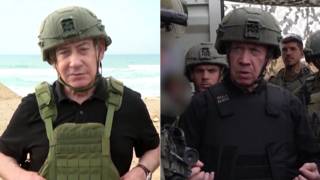

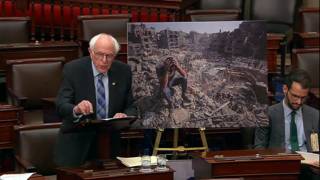
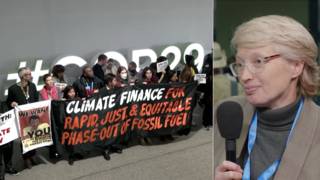




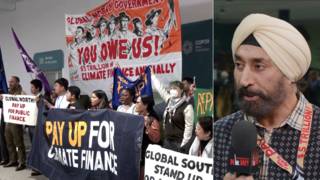
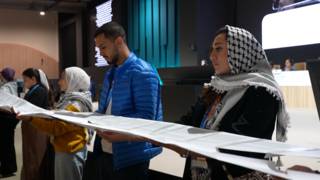
Media Options